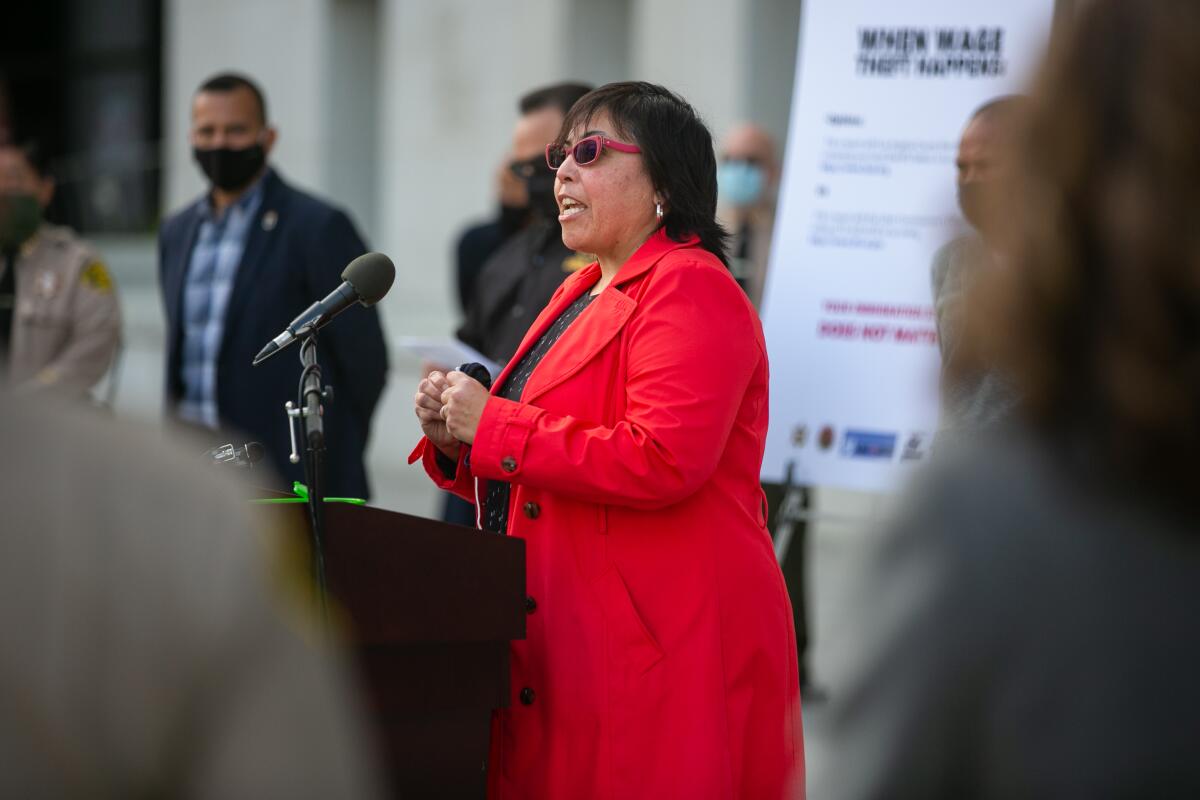Long Beach hotel fined $4.8 million for failing to rehire workers laid off during COVID-19 shutdown

- Share via
California’s labor commissioner on Tuesday ordered the Hyatt Regency Long Beach to pay nearly $4.8 million in fines for failing to offer jobs to workers who had been laid off during COVID-19 shutdowns.
The hotel did not offer job positions in a timely manner to 25 employees, including restaurant servers, bartenders, housekeepers, cashiers and stewards, according to a Tuesday news release by the office of Lilia García-Brower, the state labor commissioner. The fine will be paid to the affected employees.
The citation comes under California’s “right to recall” law, which mandates that employers in hospitality and building services industries, as their business operations come back online and return to pre-pandemic levels, offer available job openings first to those who had been laid off during the pandemic.
The law, Senate Bill 93, went into effect in spring 2021 but was intended to end on Dec. 31, 2024. On Oct. 10, Gov. Newsom signed SB 723, which extends the right of recall for employees in the hospitality and building services industries until Dec. 31, 2025. Building services jobs include janitorial, building maintenance and security services.
“Some of these employees had as much as 24 years of experience, and were suddenly out of work due to a public health emergency,” García-Brower said in the Tuesday release. “The employer failed to offer them their old jobs back in compliance with the law.”
A general manager overseeing the Hyatt’s Long Beach properties did not immediately respond to a request for comment.
The hotel strike is hitting consumers harder than any other during Los Angeles’ labor summer, bringing complaints, a disrupted wedding and violence.
Unite Here Local 11, the union representing workers at the Hyatt Regency location, said the fine is the largest issued under the right to recall law to date. The union has said the law, which requires jobs be offered in order of seniority, prevents businesses from using the pandemic shutdown to replace older workers — including many women and people of color — with younger, lower-paid staff.
The labor commissioner’s office said its investigation — which began in September 2022 after receiving complaints from Hyatt Regency Long Beach workers — included subpoenaing the hotel, interviewing workers, and conducting depositions of human resources managers.
The law allows damages of $500 per worker for each day the employer does not follow recall rights afforded to employees by the law. In the Hyatt Regency case, the state determined there had been 8,983 total days of violations.
The state issued its first right to recall citation in March 2022, to the Terranea Resort in Rancho Palos Verdes, ordering $3.3 million in fines. Terranea appealed the fines, saying the law was vaguely worded. Several months later, in July, the upscale hotel reached a settlement with the state, agreeing to pay $1.52 million without admitting wrongdoing.
Tuesday’s citation represents just the latest dispute between the Hyatt Regency Long Beach and its workers. In February, two housekeepers filed what is intended to be a class-action lawsuit against the hotel, claiming they weren’t paid double-time in accordance with a local ordinance and often missed their legally required 10-minute breaks because of heavy workloads.
It was the first lawsuit to be brought under such local ordinances in Long Beach and other California cities backed by Unite Here Local 11 and other unions that seek to regulate hotel working conditions — requiring housekeeper access to panic buttons and more compensation for heavier workloads. The litigation is pending.
More to Read
Inside the business of entertainment
The Wide Shot brings you news, analysis and insights on everything from streaming wars to production — and what it all means for the future.
You may occasionally receive promotional content from the Los Angeles Times.












